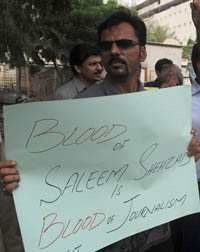On May 21 this year, a military court convicted three Pakistani naval officers of negligence and dereliction of duty for their actions during an attack on the main naval airbase in the heart of Karachi on May 22, 2011. After the incident had ended, the military said 10 security guards were killed, two aircraft were blown up, and the four men who carried out the attack were shot or blew themselves up after they had held out for 16 hours on the Mehran Naval Base.
Perhaps the best insider details about the raid came from Saleem Shahzad, a political reporter for Asia Online, in his article, “Al-Qaeda had warned of Pakistani strike,” that ran two days before his abduction on May 29, 2011. He had written in the past about militant groups and the military, with a book, Inside Al-Qaeda and the Taliban, released just weeks before his murder. In his last article, he wrote about the Mehran events, reporting that armed forces personnel sympathetic to Al-Qaeda had helped coordinate the attack. On May 31 last year, his body was found floating face-down in an irrigation ditch.
The military did not make many details public, but the sentences for the service members apparently varied. Still, justice–the military version of justice, at least–was apparently served in their cases. But Shahzad’s killers remain at large, with the case declared closed by investigators. It is very unlikely that any prosecution will ever take place–despite a high-powered judicial commission organized by the government, and whose report is now a public document. The panel failed to implicate any individual or group in Shahzad’s murder, and the government is not even keen to consider the recommendations made by the commission for reforming the intelligence agencies.
In reality, not much was expected from the inquiry given that the accusations were being made against the intelligence agencies. For Shahzad’s colleagues, many questions remain unanswered. Did Shahzad protect his sources at the cost of his life? Did he have some more news on his laptop that was embarrassing to the military? Even though the inquiry remained inconclusive; and even if the government declared his case closed; and even if no killer, whether militant or government agent, would ever be arrested; and even if Shahzad never got to reap the rewards of his reporting, the fact remains that, one year later, Shahzad’s last story on the Mehran Base attack turned out to be true.
This year, in Karachi, Shahzad’s wife invited her husband’s friends and colleagues for Islamic prayers on May 30, the day his body was found. She said it is still difficult for her to explain to her children their father’s death, especially when the story he reported turned out to be deadly accurate. And her problems, including those that accompany the loss of the family’s breadwinner, continue unabated as well. “I just want my children to get a good education and become as strong as their father. I am trying for a job in order to support their financial needs. Lot of assurance had been given to me for assistance from many sources, but I have yet to see much of it,” she said.
